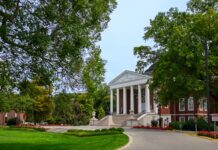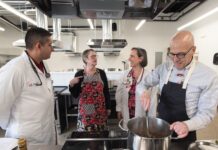These are some things University of Louisville Provost Shirley Willihnganz told new students Aug. 20 at the annual Welcome Week convocation. Her talk and a welcome from Student Government Association President Sana Abhari were part of the CAPS ceremony, a First Year Initiative event that both welcomes new students to UofL and challenges them to succeed.
CAPS stands for civic, academic, personal and social — the areas around which the First Year Initiative builds its programming. At end of the ceremony, students receive Cares caps that symbolize the university’s faith in them that they will trade their caps for mortar boards to wear as they graduate from the UofL.
But before they received their caps, Abhari, the incoming SGA president, welcomed them to UofL. She told the students about coming to the United States at age 11 from her home country, learning a new language and adjusting to a new culture. She likened their arrival at UofL to that experience, and said that — just like the United States — college is a land of opportunities.
Willihnganz talked about the usefulness of uselessness, a title she attributed to Kaori Kitao, then-art history professor from Swarthmore College who delivered a keynote address with the same title in 1999.
The provost drew from her own college experience to make her points.
Willihnganz told them that her journalism major required taking a lot of classes that had no direct relationship to gathering news and reporting it.
It would have been easy to think then, she said, that everything she was learning in some of her classes was useless for her chosen profession, but what she learned from biology, astronomy, arts and humanities has proved to be quite useful — in life.
From biology, she said, the principle of equifinality taught her to look for another way to reach her goals when she runs into roadblocks; and the principle of negative entropy taught her that you can’t let things slide, but that you have to work to make them function the way you want them to.
From astronomy, a subject for which she didn’t have a natural affinity, she said she learned to be fanciful, have fun and laugh at herself. That ability, she said, has served me pretty well, too.
Willihnganz told the students that some of her literature classes taught her to be more human and to consider what it’s like to be someone in a circumstance different from her own.
I like the word humankind. Human. Kind. I try to be both.
From public speaking, the provost said she learned that language shapes us, shapes our world and is one of the most powerful forces in the universe — and that the old adage, ‘sticks and stones can break my bones, but words will never hurt me,’ is the least true statement I know.
Before asking students to come onto the Margaret Comstock Concert Hall stage to receive their Cards caps, she reminded them of the expectations that the university has of them:
To be open to new ideas; get involved in the campus community; join organizations and take leadership roles; meet new people and make new friends; and push beyond their comfort zones.
These things can hold keys to insights that will be the very ones that will help you be better entrepreneurs, lawyers, doctors, nurses, writers and other professionals that I know you aspire to become.
But mostly, she said, as you’re navigating the next few years, and everyone is inundating you with useful information, remember that what the world most needs is passion, and for you to be you.
Find something that you love, that calls you, that uses every bit of you in service to it. More than more engineers, teachers, nurses and IT people, the world needs your passion and for you to do what you love.
But don’t limit that, because to do what you love and to find a way to make that a meaningful life that will support you and our society, you also need to stay open to all the other possibilities that are out there and the gifts that those things have for you.


























